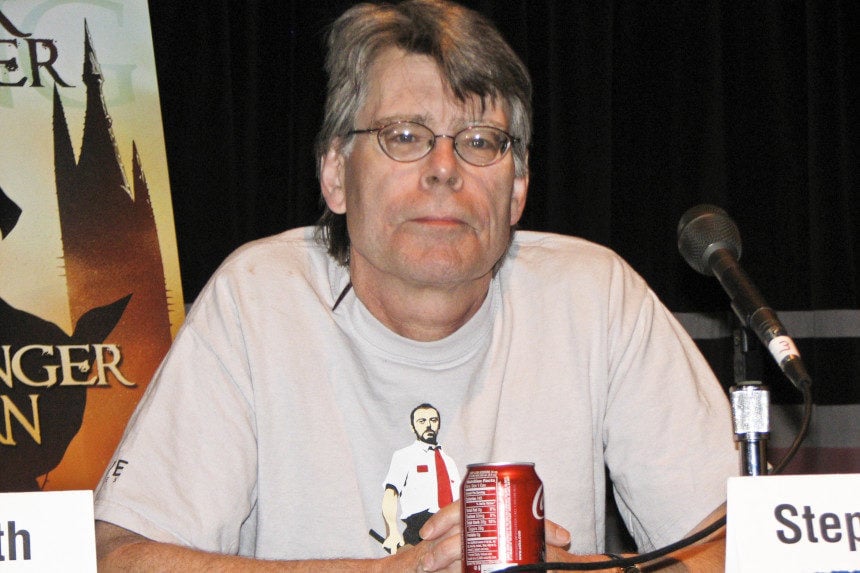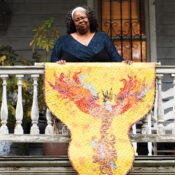It’s frankly impossible to overstate the influence of Stephen King on American popular culture. Sure, we all know that he’s the King of Horror and that he’s sold over 350 million books and that his work is regularly adapted into film and television and comics. His impact and influence hasn’t just been exerted on the field of horror and fantasy, but on so-called “literary” writers like Victor LaValle, Sherman Alexie, Karen Russell, and Haruki Murakami. With more than 60 novels, five non-fiction works, and over 200 short stories to his credit, it might also be impossible to select the quintessential King book. However, if you had to pick the work that says the most about King himself, it’s almost certainly On Writing: A Memoir of the Craft. Part origin story, part how-to manual, and part harrowing depiction of King’s recovery from a near-fatal accident, the widely praised book is celebrating its 20th anniversary with a new edition that includes contributions from his sons, the writers Joe Hill and Owen King. Now, in the week of King’s 73rd birthday, here’s a look at what makes On Writing an Entertainment Weekly New Classic, a Time Top 100 Nonfiction book, and The Cleveland Plain Dealer’s “best book about writing, period.”
Stephen King presents a wide-ranging talk about writing (Uploaded to YouTube by Politics and Prose)
The first major section of the book is called C.V. (the abbreviation for curriculum vitae, which is a look at one’s body of work). In this first of two extensive autobiographical passages, King deals comprehensively with his difficult youth, his discovery of his passion for writing, falling in love with wife (the novelist Tabitha King), breaking through with Carrie, his early fame, and his subsequent battle with alcoholism and substance abuse (which was extensive enough to require an intervention; King notes that he doesn’t remember writing all of Cujo). Each story is a block in the foundation of King’s voice. You gain an understanding of many of the levers that move his prodigious output. King also notes the self-involvement (or even obsession) that writers can fall prey to and relates the story of two desks that he’s used for writing, allowing it to become a metaphor for one simple idea: “Life isn’t a support system for art. It’s the other way around.”
The backbone of what you might call the instructional part of the text is the middle, with section names like “What Writing Is,” “Toolbox,” and “On Writing.” The thing that really separates On Writing from other how-to books about the field is King’s approach. While there’s a degree of “this is how you do it,” King readily admits throughout that, more or less, “this is how I do it,” noting frequently that the specifics of process change for each writer. He’s not giving you step-by-step Ikea instructions; he’s giving you a route while acknowledging that there are still many other routes that will get you to the destination. His tone is one of encouragement, but also one of caution; King believes that talent is an unteachable intangible, but he also believes in craft and improvement. That’s part of what makes the “Toolbox” section critical, in that he emphasizes the tools that all writers should have, particularly vocabulary, grammar, and style.
Stephen King talks about his writing process (Uploaded to YouTube by Bangor Daily News)
The middle portion of the book draws much attention from critics because of its plain-spoken approach. King simultaneously demystifies that process of writing while also attributing some of the success of it to “magic.” But King seems to impart that you don’t get to magic without knowing the tools, and that’s important. Writers need to read, they need time to form, and they need to work. King isn’t King just because of his fame or money or output, it’s because he works. Every day, the Sun comes up, babies are born, and Stephen King is writing something. There’s optimism in his instruction, almost an “if I can do it, you can do it” kind of humbleness, even as he points out that this stuff isn’t as easy as he makes it look. He’s not teaching you how to become a brand name, but he’s teaching you about the discipline.
“On Living: A Postscript” sees King dealing with the accident that nearly killed him in 1999. As he was out for a walk, King was struck by a van driven by a distracted driver. He suffered grave injuries; among them, his leg was broken in nine places, his knee was basically split, his right hip was fractured, he had four broken ribs, and his spine was “chipped in eight places.” As terrible as that sounds (and it was terrible), King somehow landed in the perfect spot after the impact threw him several feet through the air. If he had deviated in course to the left or right, he likely would have suffered fatal traumatic head injury due to rocks or railing. As it was, he was in the hospital for three weeks and went through multiple surgeries to address his injuries. King then confronted something else that was harrowing in its own right: getting back to a writing routine after that, something that Tabitha King played a crucial role in achieving. Obviously, King succeeded, but the difficulty that he had is palpable on the page.
Stephen and Owen King talk about collaborating (Uploaded to YouTube by Good Morning America)
In the anniversary edition, King’s sons offer contributions. Joe Hill has built his own bestselling brand in the horror genre with novels, comics, and short stories, while also seeing film and television adaptations of his work, notably Locke & Key and NOS4A2. Owen King is also a prolific writer of novels, short stories, and articles who in 2017 co-wrote the novel Sleeping Beauties with his father. Hill’s contribution is his transcript of a talk with his father at Porter Square Books from 2019, while Owen King’s piece reprints his article “Recording Audiobooks For My Dad, Stephen King” from the New Yorker site. Both segments add insight to the process that bring some extra color to the book overall. There’s also an updated “Reading List” from King himself, packed with books that he simply thinks that writers should read, which contains items perhaps expected (Golding’s Lord of the Flies, Conrad’s Heart of Darkness) and unexpected (Anne Proulx’s The Shipping News, Evelyn Waugh’s Brideshead Revisited).
As a writer, King’s impact is immeasurable. Heavily awarded over time, King can count a National Book Foundation Medal for Distinguished Contribution to American Letters, a World Fantasy Award for Life Achievement, and a National Medal of Arts among his accolades. On Writing is certainly a departure from expectations, but it remains thoroughly King. It’s considered a high-water mark for a book of its type because articulates big ideas in a way that anyone can understand, and it offers encouragement in a discouraging profession (and world). King insists that all writers need to read; On Writing remains a great place to start.
Featured image: George Koroneos / Shutterstock
Become a Saturday Evening Post member and enjoy unlimited access. Subscribe now



